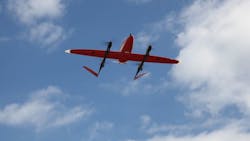Ørsted, DSV to test cargo drones at Anholt offshore wind farm
Offshore staff
DENMARK — Ørsted and DSV have launched an initiative to bring the spare parts warehouse closer to service technicians, thereby ensuring wind turbines get back online more quickly.
The drones are powered by renewable electricity and will fly autonomously to the offshore substation, but the companies hope to test the drones on flights to the wind turbines at a later stage.
The companies said the oversea trials from Grenaa to Anholt are the first of their kind, and the partnership between Ørsted and DSV will explore opportunities for using drone technology at sea.
Drones versus ships
Offshore wind farms are usually located far from shore, and the service technicians and necessary spare parts are usually transported by ship. Technicians bring their tools and the components most often needed for the wind turbines, but if special spare parts are needed, they must go back onshore to get them. This is both costly and time-consuming, and the repairs are therefore often delayed until the next day.
As an alternative, cargo drones offer logistics support, especially for small spare parts, contributing to a much faster wind turbine restart.
"By being able to quickly and efficiently deliver the spare parts needed for repairs, wind turbine downtime can be reduced, thereby increasing the production of clean energy," said Klaus Baggesen Hilger, Ørsted's head of operations, Digital & Innovation. "At the same time, the need for transport by ship is reduced as well as the carbon emissions from operating offshore wind farms.”
DSV is already using drones in its own logistics centers and sees potential opportunities in using drone technology in new contexts.
“At DSV, we’re constantly working to create optimal supply chains for our customers, so it was a good opportunity for us to collaborate with Ørsted on optimizing their supply chain from the shore to offshore wind farms," said Peter Matthiesen, DSV's head of Innovation & Digital Products. "It’s fast, cost-effective and renewable, so we’re looking forward to performing the test flights.”
About the test flights
The test flights will run over two weeks, during which the drone will demonstrate it is capable of delivering components from Ørsted’s operations base at the Port of Grenaa to the offshore substation 25 km out at sea and, potentially, to the wind turbines. The trials will be conducted using an electric drone with a range of 100 km and a payload capacity of 2.5 kg.The aim of the trials is to test whether cargo drones can serve as a realistic logistics supplement for the company’s many offshore wind farms in operation.
DSV has engaged the services of Swiss drone supplier RigiTech and Danish operator Holo, both of which specialize in autonomous mobility solutions. RigiTech and Holo will both support the drone test flights.
06.29.2022

